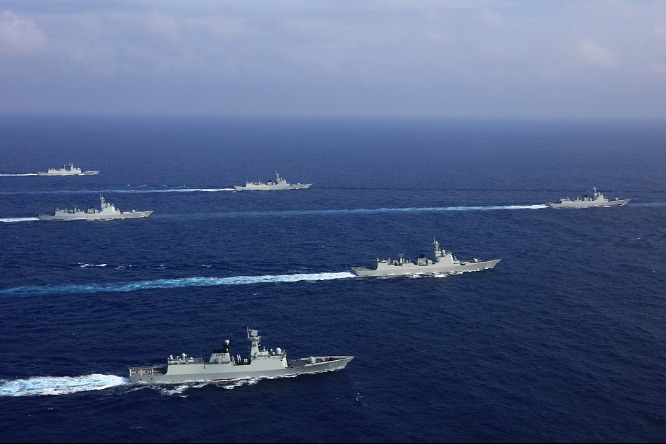
Although China and the Association of Southeast Asian Nations are on the course to negotiate the text of a code of conduct in the South China Sea, outside forces continue to try and make waves.
According to a statement released by the US military on Wednesday, the United States and the United Kingdom conducted coordinated drills in the South China Sea between January 11 and 16.
This show of force in the sensitive waters can by no means be interpreted as a goodwill gesture. It only further complicates the situation in the South China Sea and turns it into a potential regional flashpoint.
Defending freedom of navigation is the justification given for such military maneuvers in the South China Sea, yet the only impediments to it are such provocative actions.
As the world’s second-largest economy, China knows full well how important it is for the international shipping lanes to be unimpeded. But by barging through the door of China’s territorial waters uninvited in this way, the US and its allies force China to shoo them away. Although it is their actions which are unruly, they then create a fuss about how aggressive China is.
The US calculations of the risks and benefits of such military provocations have more to do with its own sense of identity and its feelings of insecurity when it is not throwing its weight around, rather than any desire to get involved in regional affairs in a constructive way.
The US has found a willing accomplice in the UK, which having hobbled itself with Brexit is desperately seeking a supportive shoulder to lean on, preferably one that will dip its hand into its wallet to extend a token of thanks.
Instead of projecting their power in waters thousands miles away and creating an unnecessary ruckus, both the US and the UK should mind their own business. After all, the historic government shutdown in the US and the UK’s Brexit shambles show they have much to do back home.
China has made it clear it will not back down in the face of the US and its allies baring their teeth and growling hypocritically about recalcitrant behavior.
There is a consensus in the region that interference from outside forces in regional affairs is the biggest threat to peace and stability, as it is habitually and intentionally disruptive.
By finalizing a code of conduct for the waters, and enhancing their cooperation in developing the maritime economy, scientific research and weather forecasting, maritime search and rescue, and anti-piracy operations, China and other countries in the region can ensure such outside meddling does not achieve its divisive and disorderly intentions.
(This is an editorial published on China Daily on January 18)


